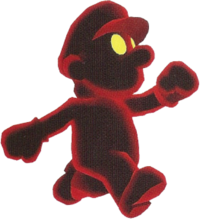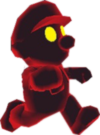Cosmic Clone
- Not to be confused with Cosmic Mario or Shadow Mario.
| Cosmic Clone | |||
|---|---|---|---|
 Artwork of a Cosmic Clone from Super Mario Galaxy 2 | |||
| First appearance | Super Mario Galaxy 2 (2010) | ||
| Latest appearance | Super Mario 3D Land (2011) | ||
| |||
| |||
Template:Quote2 Cosmic Clones are shadowy duplicates of Mario or Luigi that first appeared in Super Mario Galaxy 2. They copy Mario or Luigi's every move, even his death animation if he loses a life. They appear to be a successor to Cosmic Mario: They are strikingly similar to it, sharing the same voice as it, and their theme is the Cosmic Comet theme from Super Mario Galaxy (a half step higher pitch and an edited opening section, which in turn is a cover version of the Super Mario Bros. Ground Theme and Underground Theme). The only difference is their color and the Cosmic Clones' glowing yellow eyes.
History
Super Mario Galaxy 2
In Super Mario Galaxy 2, Cosmic Clones are created once a certain point is reached in a galaxy and follow behind Mario or Luigi, mimicking every movement he makes. Boards usually warn Mario and Luigi that Cosmic Clones are present in the area, although they also appear when a Clone Comet orbits a galaxy.
Cosmic Clones mimic whatever Mario or Luigi does, even if the landscape has recently been changed. For example, they can jump on a platform where Mario or Luigi was standing, even if it has disappeared or moved. If Mario or Luigi gets hit by a clone, he receives damage and the clone vanishes, with the rest of the clones then mimicking the plumber taking damage. Once the way forward is revealed, the clones scream, disappear, and release three Star Bits each.
Super Mario 3D Land
Cosmic Clones appear in the Special Worlds of Super Mario 3D Land, where they resemble Small Mario. Regardless of which character encounters a Cosmic Clone, the clones always resemble Mario's appearance more than Luigi's. They act as they do in Super Mario Galaxy 2, but they have a purple outline instead of a red one, and only one appears instead of a group; this one does not vanish if Mario or Luigi touches it. Mario or Luigi can defeat the Cosmic Clones by touching them while invincible or by touching the level's Goal Pole; they give three coins upon defeat. Upon the player reaching a certain area (normally the level's halfway point), the Cosmic Clone disappears. If the player leaves that area, the Cosmic Clone appears again, even if it has been defeated with a Super Star.
This game also introduces Big Cosmic Clones, which have a slower and lower-pitched voice and are four times as big. They can also destroy Brick Blocks on contact, and they give ten coins when defeated.
The clones' theme music is the same as in Super Mario Galaxy 2, albeit with most of the fading cosmic synth pads removed.
Locations
Super Mario Galaxy 2
Super Mario 3D Land
- Special 1-2 (Regular)
- Special 4-2 (Regular)
- Special 5-2 (Regular)
- Special 6-4 (Regular)
- Special 7-2 (Regular)
- Special 7-4 (Big)
- Special 7-
 Castle (Big)
Castle (Big) - Special 8-1 (Regular)
- Special 8-3 (Big)
- Special 8-5 (Big)
- Special 8-
 Crown (appears at the part with Burners) (Big)
Crown (appears at the part with Burners) (Big)
Gallery
Super Mario Galaxy 2
Super Mario 3D Land
Special 7-
 Castle
Castle
Special 8-
 Crown
Crown
Additional names
Internal names
| Game | File | Name | Meaning
|
|---|---|---|---|
| Super Mario Galaxy 2 | ObjectData/MarioShadow.arc ObjectData/LuigiShadow.arc |
MarioShadow LuigiShadow |
Cosmic Mario Cosmic Luigi |
| Super Mario 3D Land | romfs/ObjectData/GhostPlayer.szs | Ghost Player | Ghost Player (shared with Mummy-Me) |
Names in other languages
| Language | Name | Meaning | Notes |
|---|---|---|---|
| Japanese | マネック[?] Manekku |
From「真似」(mane, imitation) and possibly「ミミック」(mimikku, mimic) | |
| ちびマネック[1] Chibi Manekku |
Small Cosmic Clone (Super Mario 3D Land) | ||
| Chinese (simplified) | 模仿客[2] Mófǎng Kè |
Literally "Imitate Outsider", while「客」is a transliteration of the Japanese name | |
| Chinese (traditional) | 黑影子[?] Hēi Yǐngzi |
Black Shadow | |
| German | Schattenmario[?] | Shadow Mario | |
| Italian | Duplimario Ombra Scura (Super Mario Galaxy 2)[?] |
Contraction of "duplicate" and "Mario" Dark Shadow |
|
| Korean | 검은그림자 Geomeun geurimja 따라클 Ttarakeul[?] |
Black Shadow From "따라하다" (ttarahada, to imitate) |
|
| Spanish (NOA) | Sombras de Mario[?] | Mario's Shadows | |
| Spanish (NOE) | Sombra de Mario[?] | Mario's Shadow |
Trivia
- Mummy-Mes from Captain Toad: Treasure Tracker have the same behavior as Cosmic Clones.
- In Super Mario Galaxy 2, only the first clone uses voice clips when jumping. If the player is hurt by the first Cosmic Clone, the other ones only play sound effects.
References
- ^ Shogakukan. 2015. Super Mario Bros. Hyakka: Nintendo Kōshiki Guidebook, Super Mario 3D Land section, page 180.
- ^ https://www.ique.com/3ds/arej/course/index.html





















